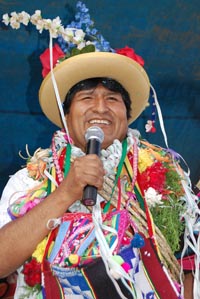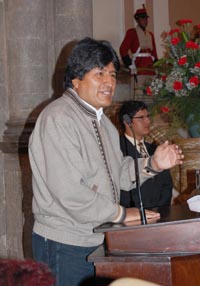Morales: “We’ll Stay Until We Change Bolivia”
March 14, 2009 - Latin American Hearald Tribune
By Luis Lidon Lehnhoff
VIENNA – Bolivian President Evo Morales says the grassroots movement that brought him to office in 2006 will remain in power as long as it takes to effect real change in the impoverished Andean nation.
 The socialist head of state thinks it will require at least another decade to reorder the Bolivian economy, he told Efe in an interview here.
The socialist head of state thinks it will require at least another decade to reorder the Bolivian economy, he told Efe in an interview here.
“It’s impossible in three years of government, of the presidency, to repair the damage of 500 years,” Morales said. “It’s impossible, for example, that Bolivia stops exporting raw material, if we speak of natural resources. We need at least five or 10 years.”
“On questions of industrializing the natural resources, at least 10 years. For example, lithium or petrochemicals or the hydroelectric plants. In 183 years of our life as a republic the governments that passed through the (presidential) palace never thought of Bolivia. They only thought of themselves,” he said.
Bolivia was a source of silver for the Spanish Empire and then a leading exporter of tin. Today, the country’s greatest natural resources are its estimated 48 trillion cubic feet of natural gas and the world’s biggest deposit of lithium, which has become important thanks to the push for electric cars.
Morales wants Bolivia to become more than an exporter of raw materials.
His government is trying to develop a petrochemical industry and has told foreign companies interested in the lithium that La Paz will grant mining concessions only to firms prepared to manufacture electric cars in the Andean nation.
Within months of taking office, he asserted the state’s ownership of the gas and forced multinational energy companies to become minority partners with state-owned YPFB. And his mantra regarding foreign investment is that Bolivia “needs partners, not bosses.”
“We are not visiting the palace or passing through, we are going to stay a long time, until we change Bolivia,” the president said Thursday at the U.N. offices in Vienna.
 “I don’t say this of myself, as it is the social movement that has reached the palace,” he continued.
“I don’t say this of myself, as it is the social movement that has reached the palace,” he continued.
The first indigenous president of Indian-majority Bolivia stressed the need for a strong state to ensure that basic needs are met.
Touting the achievements of his government, he said that Bolivia has become only the third Latin American country to eliminate illiteracy.
Morales said his administration is currently extending zero-interest loans to farmers as part of its plan to ensure food security for Bolivia.
“Before, private credit was only for services and trade. We have created the Bank of Productive Development, with loans at 6 percent annual interest,” he said. “Before, it was up to 36 percent annually. Twenty percent minimum.”
The president said his greatest wish is for national reconciliation between Bolivia’s “numerous and very poor” indigenous peoples and the remainder of the population. EFE